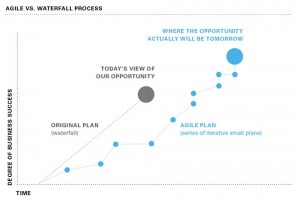In today’s ever-changing landscape, where single channel or even multichannel world is being surpassed by a cross-channel reality, marketers no longer have the luxury of spending countless days designing and planning large project. The reality of today’s fast-paced world pushes marketing professionals to innovate and create content and campaigns almost on the fly.
CMG Partners, a marketing strategy consultancy, who has explored in details the role of CMOs within their organisations explain in one of their reports “Agile for Marketing (A4M) drives long-term marketing strategies with short-term, customer-focused iterative projects that improve responsiveness and relevance. It allows for faster creative, more testing, smarter improvements and better results.”
While this sounds all good and nice there is still much room for improvement. Their survey from 2014 found that over 63% of marketing leaders indicate that agility as a high priority, but only 40% rate themselves as ‘agile’. There is ample room for improvement to say the least, particularly as the same study found that marketing departments who consider themselves agile are three times more likely to significantly increase their organisations market share.
Source: Forbes
Why apply the Agile approach commonly used in software development to marketing?
Now a days marketing departments require an approach that can adapt fast and effectively to the constant alterations of the marketplace. In a nutshell, marketing departments need to work flexibly and dynamically, being more productive, and more collaborative and integrated in their work product. By implementing a agile approach, marketing departments/agencies can gain the flexibility and productivity they require to increase speed-to-market and ultimately create more relevant end-products.
Does Marketing really understand Agile?
It’s all good and well that we understand the marketing departments/agencies understand that they need to be nimble and quick to react to the market, but to achieve true agility it is paramount that the organisation is data-driven, customer-centric with tried and tested internal processes that enable quick decision making. Yet having all of this in place, does not make an organization Agile, in terms of the methodology and its application to the marketing profession.
Agile is not only a working methodology but a culture, one that through a pre-set structure allows for marketing professionals to be iterative, flexible and quick on their feet to react to changing requirements from stakeholders. The problem lies in that although Agile marketing has been a concept that has been around for a few years now, the profession is not overly accustomed to the nonlinear progress that the Agile methodology proposes.
Conclusion
As marketing takes over from sales as being the main driver of growth within their respective organisations, there is an unprecedented need for go-to market speed and adaptability. Moreover, with the relative ease of access to customer data that exists today the possibility of conducting an iterative approach with test, learn and redeploy activities is becoming easier and easier and more cost effective. The perfectionist model where everything is planned out to the last minute detail and goes through an never ending QA process that starts with the Marketing Executive and ends at C-Level just does not fit anymore in today’s world where real-time/real-life testing can provide incredibly valuable feedback for optimising ongoing projects and maximising ROI.
Recommended Resources
Succeeding with Agile: Software Development Using Scrum by Mike Cohn
Scrum Marketing: Applying Agile Methodologies to Marketing: Your Essential First Booklet about Implementing Agile/Scrum in Marketing Organizations by James S. Wright
If you believe your business could do with IMS’s support in any of our areas of expertise please reach out at +353 (0)91 739450 or john@imsmarketing.ie.

